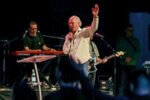Today the third person of the Trinity is underappreciated by those who misunderstand Him and misrepresented by those overzealous for His manifestations. Somewhere between those extremes we must realize our desperate need for a genuine move of the Holy Spirit.
The world is full of books about God the Father who created the universe, and more books are written about Jesus the Son of God than anyone who ever walked on this planet. But isn’t it interesting that far fewer books have been written about God the Holy Spirit?
When teaching on prayer, Jesus declared, “If you then, being evil, know how to give good gifts to your children, how much more will your heavenly Father give the Holy Spirit to those who ask Him!” (Luke 11:13, emphasis added). You’d think that promise would create a huge desire to know more about this promised Helper—?who He is and what He does. And it would be even better if we were to experience Him as a living reality the way the early believers did.
We know that Jesus the Son is seated at the right hand of the Father (Luke 22:69; Eph. 1:20; Col. 3:1). So that means the Holy Spirit is God’s only agent on Earth. He is the only experience we can have of God Almighty, the only way we can have the work of Jesus Christ applied to our lives and the only way we can understand God’s Word. Without the Holy Spirit, we are like the disciples before Pentecost—?sincere but struggling with confusion and defeat.
More than 100 years ago, Samuel Chadwick, a great Methodist preacher and leader in England, summed it up concisely: “The Christian religion is hopeless without the Holy Ghost.”
The early church provides the perfect illustration of that hopelessness. It was made up of simple men and women. The leaders were former fishermen and tax collectors who fled in fear when Jesus was arrested and needed them most. They weren’t courageous and faithful. In fact, they lacked faith and courage. They were the least likely to be put in charge of any Christian enterprise.
Yet after the events in Acts 2, when the Holy Spirit was poured out, those same nobodies were suddenly transformed. With courage and faith, they turned their community, and eventually the world, upside down.
It wasn’t a result of their seminary training; they didn’t have any. They couldn’t hand out copies of the New Testament; it hadn’t been written yet. It wasn’t because they were wealthy and had the greatest sound system and light show at their church; they were poor people without a church building.
To the existing Jewish religious establishment, those early Christians were mocked as unlearned and ignorant people with few resources. To the Roman Empire they seemed fanatical and strange.
But one thing they did possess was the power of the Holy Spirit. Jesus told them to rely on the Spirit for everything. The early believers knew well that Christianity was hopeless without the Holy Spirit.
Giving the Spirit His Due
The Holy Spirit is underappreciated and underpreached by the 21st century church. There is a prejudice of sorts against the Holy Spirit that impedes many from learning more about Him.
The body of Christ is often divided into two sides. One side stresses the Word of God, separating itself from what it views as the emotional fanaticism often linked to those emphasizing the work of the Holy Spirit. The other side is sometimes known for drifting into unbiblical manifestations and unorthodox teaching while attributing it all to the Spirit of God.
Seeing the abuse and bad teaching, many on the first side will say: “I’m not interested in experiences and manifestations of the Holy Spirit. I just want to study the Word.”
But it was the Holy Spirit who inspired the Bible, and there are lots of promises concerning His person and work. How can anyone treasure God’s Word without giving the Holy Spirit His rightful place?
To those who move in circles strongly emphasizing the Holy Spirit, they must be reminded that everything must be tested by Scripture. The Spirit never contradicts the Word He gave us. He also never puts the focus on the preacher, because the Holy Spirit was sent to glorify Christ alone (John 16:14).
Somewhere in the middle is the kind of Christianity we see in Scripture, where the Word of God is honored along with a childlike dependence and openness to the Holy Spirit. Only the Holy Spirit can make the things of Christ real and alive to people.
Christianity does not stop at the cross where Jesus died and paid the price for our sins. After Good Friday was Resurrection Sunday, when the Spirit raised Christ.
Yet so many of us live with faint trickles and shallow pools of the Spirit, rather than the promised rivers of living water. “On the last day, that great day of the feast, Jesus stood and cried out, saying, ‘If anyone thirsts, let him come to Me and drink. He who believes in Me, as Scripture has said, out of his heart will flow rivers of living water’” (John 7:37-38, emphasis added).
By this He meant the Spirit. Everything about the Spirit speaks of powerful currents of life that refresh us and flow out to bless others.
Let’s remember how any person becomes a Christian: Before a person can feel the need for Jesus Christ as Savior, he or she must first be convicted of sin. “And when He has come, He will convict the world of sin, and of righteousness, and of judgment” (John 16:8). The Holy Spirit shows us our sin and our need for a Savior. That is what every believer experiences in conversion to Christ.
It is the Holy Spirit working inside of us that causes us to turn from our sin and fix our eyes on Jesus. While we may be tempted to think we can create emotional environments for this to happen, the truth is that this kind of rebirth or transformation can happen only through the work of the Holy Spirit.
When God looks down on the earth, He doesn’t focus on ethnicity, and He never acknowledges religious denominations. He just sees two kinds of people: His children who have the Spirit living inside of them and unbelievers who don’t have the Spirit living inside of them. It’s as simple as that.
Today we split hairs about doctrinal positions to validate our faith, but to the early church the definition was simpler. Either we are temples or we are not temples. Paul wrote, “If anyone does not have the Spirit of Christ, he is not His” (Rom. 8:9).
It would have been impossible for the apostles to consider someone a true believer in Jesus without the accompanying witness and work of the Spirit. The Spirit of God was the bottom line.
And He still is. His miraculous work on behalf of believers hasn’t ended.
One Saturday night, I got a call from our chief financial officer, Steve. A pastor we knew of in Gojra, Pakistan, had telephoned him and reported a problem in his city.
“What’s wrong?” I asked Steve.
“At the five o’clock Muslim call to prayer, something set them off,” he replied. “Now they’re shouting: ‘Death to the Christians! Burn their houses down. Death to the Christians!’ The pastor’s really concerned.”
“OK, I am going to pray tonight. You pray too, Steve,” I said.
I prayed that night, and then saw Steve the next day as our service was beginning. He was holding his cellphone, and I could tell by the look on his face that something was wrong.
“The pastor just called again. The situation’s worse,” Steve said. “He’s on the rooftop with his wife and children and some of the local Christians. There are thousands of people in the square chanting, ‘Death to the Christians!’ I can hear the fear in his voice and the chanting mob in the background, so I know what he’s saying is true.”
I felt as if I’d taken a punch and the air had been knocked out of me. As we walked into the sanctuary, the congregation was singing and praising God. When the song ended, I interrupted and told the congregation, “We’re going to get back to worshipping God in a moment, but right now there is an emergency situation we have to pray about.”
I told the church what I knew and asked our worship leader to lead in prayer. Suddenly a chorus of cries went up to God on behalf of the Pakistani believers. It was just like what occurred in the book of Acts: “They raised their voices together in prayer to God” (4:24, NIV).
Later in the day, Steve gave me an update. “You won’t believe this,” he said. “The pastor called me back. As they were on the rooftop, some clouds came out of nowhere. It rained so hard it dispersed the crowd! Everyone was safe, and they were able to get off the roof and return to their homes.”
I couldn’t wait to tell the church. God rescued the man, his family and the other local Christians through the prayers of His people half a world away. The Holy Spirit was working in Pakistan, protecting those believers from the mob. But at the same time, the Holy Spirit was also moving among the people of our church, helping them to pray fervently and with a bold faith that only God could give.
Genuine Manifestations
To many people this story about Pakistan might seem “out there.” But maybe that’s because without the Spirit of God moving strongly among us, many of us have become faithless and cynical. We have seen so much ministerial self-aggrandizement and so many dubious financial appeals linked to a supposed “Holy Spirit anointing” that we have turned away in disgust because so little of it reminds us of Jesus.
But don’t the false appeals prove that something true really does exist? William Booth, founder of the Salvation Army, said: “We are not such fools as to refuse good bank notes because there are false ones in circulation; and although we see here and there manifestations of what appears to us to be nothing more than mere earthly fire, we nonetheless prize and value, and seek, for the genuine fire which comes from the altar of the Lord.”
The counterfeit proves there must be a true genuine manifestation of the Holy Spirit! There is a counterfeit gospel, but there is also a true message of salvation. There are false portrayals of Jesus, but there is also the true Son of God, Savior of the world. And so it is with the Holy Spirit. We must not be scared away by the abuses.
To the Corinthians, Paul said: “Now to each one the manifestation of the Spirit is given for the common good” (1 Cor. 12:7). Now what are we going to do with this verse? The infallible Word of God says the manifestation of the Holy Spirit was given to each one for the common good. To each one, not just to the apostles.
Think of the impact of that verse. Is that something we preach? Do we believe it? Do we pray about it? Do we expect it? God has promised every one of us a manifestation—?supernatural by definition—of the Holy Spirit. It is part of being a Christian. To water that down to mean human talent is unbelief in God the Holy Spirit.
One of the ways the Spirit glorifies Christ is to build up His body for the common good. That is how God strengthens His church. Since the church is a spiritual organism, it needs spiritual ministry to build it up.
Spiritual ministry can only come by the Holy Spirit showing Himself through human beings. His power flows through human vessels.
Our Lord Jesus Christ never intended that His church operate without visitations and blessings from the living Spirit of God. Why would He send another Helper if not to help us? Just look around at our world. Don’t we see the obvious need of something fresh from God to overcome the powerful influences of evil?
The early church was alive and active because of the Holy Spirit. There is no verse—not even one—?that relegates the importance and vitality of the Spirit only to the New Testament church. That’s the key: We have to believe the Holy Spirit is present for us today.
We can receive only according to our faith. If we don’t believe, we won’t pray; and when we don’t ask, we won’t receive the blessings God has for us.
How easy it is for us to become parched and dry. What we need are fresh showers of blessing to soften our hearts and bring fruitfulness to our lives. That’s why the Old Testament prophet cried to God, “Rend the heavens and come down” (see Is. 64:1, 3).
Come down on us, Holy Spirit, for we are truly helpless without You.
Jim Cymbala is the pastor of Brooklyn Tabernacle in New York City, the church he has led since the 1970s. He is also the author of several books, including the best-selling Fresh Wind, Fresh Fire. This article was taken from Spirit Rising by Jim Cymbala. Copyright © 2012. Used by permission of Zondervan. www.zondervan.com.







Leave a Comment
You must be logged in to post a comment.